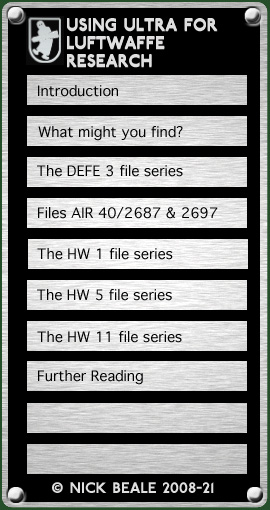There are any number of books available about Ultra. Some that I found good as background to how it was done are listed below. Books tend to have lots to say about U-boat ciphers but less about Luftwaffe ones. Once the Luftwaffe traffic was broken into it was read quite consistently; access to the naval material was much more precarious and that makes for a dramatic narrative. Christy Campbell Target London: Under Attack from the V-Weapons during WWII (Abacus, 2012) ISBN 978-0-349-12356-1 Explains the contribution of Ultra, alongside other sources, to the British discovery of the V-weapons and to the efforts to counter them. F.H. Hinsley & Alan Stripp (Editors) Codebreakers: The Inside Story of Bletchley Park (Oxford Paperbacks, 1994) ISBN-10: 019285304X, ISBN-13: 978-0192853042 Very technical at times, this is the one to read if you want a step-by-step guide to setting up and using an Enigma machine. You could almost build one with the information given here. David Kahn Seizing the Enigma: The Race to Break the German U-boat Codes, 1939–43 (Arrow, 1996) ISBN: 0099784114) Purely naval, as the title says but a reminder that subterfuge and sheer audacity played a vital part alongside mathematical and electro-mechanical genius. Hugh Sebag-Montefiore Enigma: The Battle for the Code (Phoenix, 2001) ISBN-10: 0753811308 ISBN-13: 978-0753811306 Montefiore goes from the invention of the Enigma machine through pre-war espionage to early Polish successes and into the wartime work of Bletchley Park. Only a brief reference to the "Colossus" computers and Bletchley's success against the Lorenz Geheimschreiber traffic. Michael Smith The Secrets of Station X (Biteback, 2011) ISBN 978-1-84954-095-7 Perhaps the most comprehensive of all these in its coverage of the range of work undertaken at Bletchley Park and its outstations, as well as the work of the Y-Service. Also describes the prewar efforts against Enigma in Poland, France and the UK. The website Tony Sale's Codes and Ciphers is an excellent reference source on the work of Bletchley Park. (Tony Sale died on 29 August 2011).
And I thoroughly recommend a visit to Bletchley Park itself, the museum is fascinating.
|
||

 Most importantly, the files themselves: I believe that the DEFE3 material has long been available on microfilm in Canada and the USA. It can now be downloaded free from
Most importantly, the files themselves: I believe that the DEFE3 material has long been available on microfilm in Canada and the USA. It can now be downloaded free from 